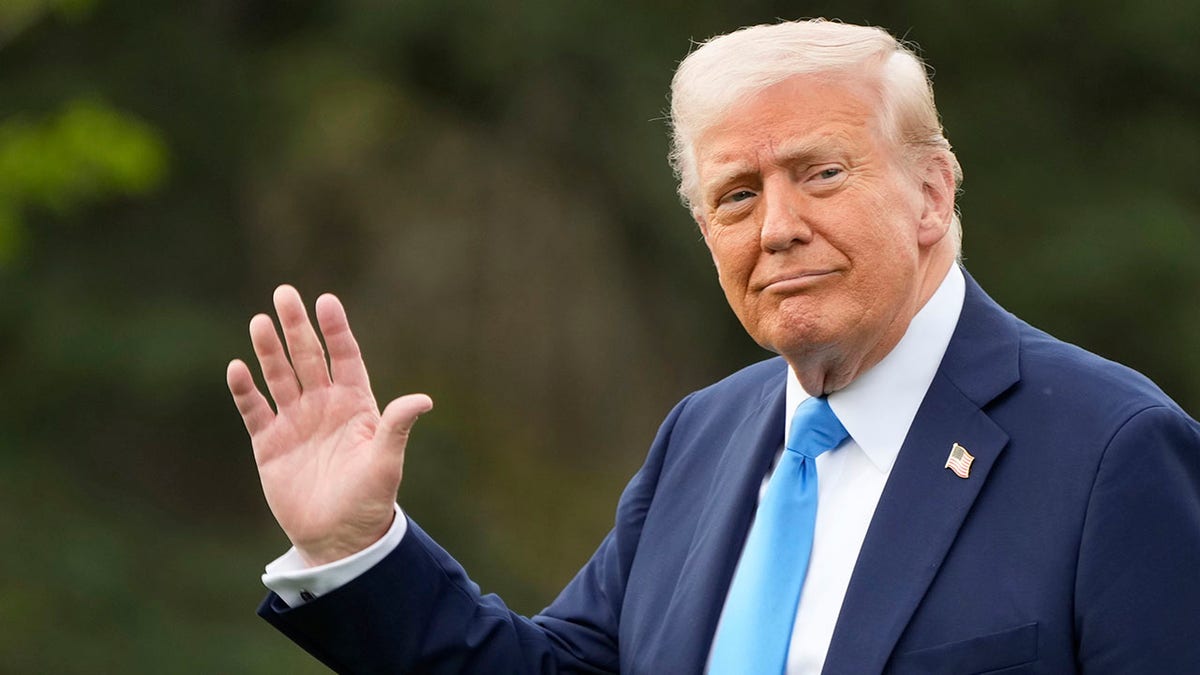INTERNACIONAL
More Americans support than oppose Trump’s Army celebration parade: Poll

NEWYou can now listen to Fox News articles!
As President Donald Trump hosts events on Saturday to celebrate the U.S. Army’s 250th anniversary, a new national poll indicates more Americans are likely to approve than disapprove of the president’s decision to hold a military parade.
But six in 10 Americans are concerned about the cost of the parade, saying it’s «not a good use» of government money, according to an Associated Press-NORC Center for Public Affairs Research survey.
Trump, who is marking his 79th birthday on Saturday, is scheduled to give a speech during the parade, which will take place Saturday evening along the National Mall in Washington D.C.
Defense officials say roughly 6,600 soldiers will march in the parade, with some 50 military aircraft and 150 vehicles, including tanks, rocket launchers, and missiles. The Army says it’s spending $25-$45 million to pay for the parade, which includes fixing D.C. streets damaged by the tanks.
TRUMP WARNS ANY PROTESTERS AT HIS MILITARY PARADE WILL BE ‘MET WITH VERY BIG FORCE’
Crews work on setting up an archway on the National Mall, during preparations for an upcoming military parade commemorating the Army’s 250th anniversary and coinciding with President Donald Trump’s 79th birthday, Thursday, Jun. 12, 2025, in Washington. (AP Photo/Rod Lamkey, Jr.)
Trump has defended the cost of the parade, saying last month in an interview on NBC’s «Meet the Press» that it would be «peanuts compared to the value of doing it.»
«We have the greatest missiles in the world. We have the greatest submarines in the world. We have the greatest army tanks in the world. We have the greatest weapons in the world. And we’re going to celebrate it,» the president said.
TRUMP TO HOST MILITARY PARADE TO CELEBRATE ARMY’S 250TH BIRTHDAY
But some in Congress are criticizing the parade, saying the money could be better spent.
«If it was really about celebrating military families, we could put $30 million toward helping them offset the cost of their child care, food assistance and tuition,» Sen. Tammy Duckworth, a military veteran who lost both of her legs in combat while piloting an Army Black Hawk helicopter during the Iraq War, said in a social media post.
«But it isn’t. Trump is throwing himself a $30 million birthday parade just to stroke his own ego,» Duckworth argued.
According to the poll, 40% of adults nationwide approved of the military parade, with 29% disapproving, and three in 10 neither approving nor disapproving.
There was an expected partisan divide, with two-thirds of Republicans approving of the president’s move to hold the parade, and half of Democrats disapproving.
But in a separate question, 60% of those surveyed said holding the parade was not a good use of government funds, with 38% disagreeing.
Nearly two-thirds of Republicans said holding the parade was a good use of government funds, while eight in 10 Democrats disagreed.
The White House, in a statement, said that the parade «will be a unifying celebration for not only the thousands in attendance, but Americans across the country who can participate in honoring our active-duty servicemembers, Veterans, and fallen heroes.»

People pass by and take photos with a tank, parked on the National Mall, during preparations for an upcoming military parade commemorating the Army’s 250th anniversary and coinciding with President Donald Trump’s 79th birthday, Thursday, Jun. 12, 2025, in Washington. (AP Photo/Rod Lamkey, Jr.)
Pro-democracy, progressive, and labor activists are planning protests in all 50 states on Saturday that will coincide with Trump’s military parade. Many are part of a series of «No Kings» protests across the country, with more than 1,500 rallies scheduled for this weekend.
But organizers decided against holding a major protest in the nation’s capital and instead will hold their main event in Philadelphia.
CLICK HERE TO GET THE FOX NEWS APP
The poll, which was conducted June 5-9, also indicates that 39% of those questioned approve of the job Trump’s doing in the White House, with six in ten giving the president a thumbs down.
The survey had an overall margin of error of plus or minus four percentage points.
INTERNACIONAL
EN VIVO: se inicia el American Business Forum con la presencia de Trump, Milei, Machado y otras figuras internacionales

El presidente estadounidense Donald Trump, el mandatario argentino Javier Milei y la líder opositora venezolana María Corina Machado protagonizan desde este miércoles una cumbre sin precedentes en Miami centrada en el liderazgo político en tiempos de transformación global. El American Business Forum, que se desarrolla en el Kaseya Center, reúne a figuras destacadas de la política, el deporte y las finanzas internacionales.
Trump ofrecerá su discurso este miércoles a la 1:00 p.m. (hora del este), mientras que Machado participará vía remota desde Venezuela por la mañana. Milei participará el jueves por la tarde.
El evento también contará con la presencia del astro argentino Lionel Messi y las leyendas del tenis Serena Williams y Rafael Nadal, además de ejecutivos de primer nivel como el fundador de Amazon, Jeff Bezos, Jamie Dimon, CEO de JPMorgan, y Steve Witkoff, enviado especial de Estados Unidos para Medio Oriente. La mayoría de las intervenciones serán moderadas por el periodista de Fox News Bret Baier.
A continuación, la cobertura minuto a minuto del evento:
Corina Machado: “Venezuela se convirtió en el cuartel general de los adversarios de EEUU”
Durante el diálogo con el acalde de Miami Francis Suarez, María Corina Machado alertó que Venezuela se ha convertido en “el cuartel general de los adversarios de EEUU” en el hemisferio, describiendo la presencia de Irán, Rusia y China en el país como una amenaza crítica para la seguridad regional que está ocurriendo “a solo tres horas de avión de Florida”.
Durante su participación virtual en el American Business Forum, Machado detalló las operaciones de cada país: acusó que Irán ha convertido a Venezuela en un “satélite” con Guardias Revolucionarios entrenando en el territorio, construcción de drones y uso del sistema financiero para lavado de activos de Hezbollah. Sobre Rusia, afirmó que ha proporcionado “armas, inteligencia y tecnología” al gobierno de Nicolás Maduro.
Respecto a China, la opositora señaló que Venezuela se convirtió en “el primer país al que China le otorgó préstamos en la historia, por 60.000 millones de dólares”, y afirmó que el fallecido presidente Hugo Chávez permitió a la empresa estatal china Citic hacer uso de los recursos minerales del país, por lo que “toda esta información es propiedad de China”. Machado aseguró que estos países están realizando “operaciones de inteligencia en Venezuela”.
La opositora venezolana concluyó afirmando que las operaciones del presidente Donald Trump “van a desmantelar estas redes criminales y convertir a Venezuela en el aliado más fuerte de EEUU y de las democracias occidentales de toda la región”.
Corina Machado: “Maduro empezó esta guerra y Trump la va a terminar”

La líder opositora venezolana María Corina Machado respaldó enfáticamente este miércoles la estrategia del presidente Donald Trump contra el narcoterrorismo en Venezuela, al tiempo que denunció un “fraude” en el proceso electoral de su país y afirmó que su movimiento logró demostrarlo gracias a la organización de “más de un millón de voluntarios”.
Durante su participación virtual en el American Business Forum de Miami, Machado calificó el impacto de las políticas contra los cárteles de drogas como “monumental”, pero centró gran parte de su intervención en cuestionar los comicios recientes en Venezuela. Relató que su movimiento tuvo que “contrabandear escáneres, computadoras” y que, “en menos de 24 horas, todo el mundo pudo ser testigo de nuestra victoria arrasadora”. “Ellos tenían el poder, nosotros la verdad de nuestro lado”, afirmó.
Respecto a la estrategia de seguridad, Machado aseguró que el “abordaje es correcto” al referirse a las políticas de Trump, que ha atacado barcos de presuntos narcoterroristas en aguas internacionales del Caribe. La opositora describió al dictador Nicolás Maduro como el “jefe de una estructura narcoterrorista” en lugar de un jefe de Estado legítimo, acusándolo de haber “declarado la guerra al pueblo venezolano y los pueblos democráticos de toda la región”. Machado afirmó que esta estructura se sostiene con “tráfico de drogas, armas, trata de personas” y concluyó de manera contundente: “Maduro empezó esta guerra y Trump la va a terminar”.
María Corina Machado elogia a Trump, pide un “último paso” para la libertad de Venezuela
La líder opositora venezolana María Corina Machado afirmó este miércoles que el liderazgo del presidente Donald Trump representa “una oportunidad para la seguridad de nuestro hemisferio” y lo calificó como “el último paso para garantizar la libertad” de Venezuela, Cuba y Nicaragua, durante su participación virtual en el American Business Forum que se celebra en Miami.
Machado, quien se dirigió al foro desde Venezuela, describió el evento como una “gran oportunidad” para dirigirse a lo que llamó “pioneros de esta nueva era que empieza en el continente”. En sus declaraciones, se refirió al Premio Nobel de la Paz que recibió en octubre como un reconocimiento al “coraje del pueblo venezolano” que se unió para hacer frente al que describió como “el peor régimen criminal”.
La opositora extendió el reconocimiento a los participantes del foro, diciendo que el premio era “para todos ustedes que han acompañado nuestra causa”.
Fondo soberano saudí prioriza las inversiones a 30 años y anuncia un nuevo ecosistema integrador
Fahad Alsaif, director de Estrategia de Inversión del Fondo de Inversión Pública de Arabia Saudita (PIF), enfatizó la ventaja del PIF para realizar inversiones a muy largo plazo, libres de la presión de reportar resultados trimestrales.
“Hemos hecho inversiones a 20-30 años”, indicó Alsaif, quien detalló que entre 2021 y 2025 el fondo se concentró en el potencial de 13 sectores enfocados en el crecimiento. “Ahora nos enfocamos en el impacto. Para eso hay que enfocarse en la escalabilidad”, explicó.
La nueva estrategia agrupa estos sectores en seis ecosistemas: turismo, viajes y entretenimiento con grandes proyectos de hospitalidad; manufactura avanzada e innovación que incluye IA, electrónica, aeronáutica, defensa, farmacéuticos y automotriz; industria y logística; energía sostenible e infraestructura; y NIOM, un proyecto decenal diseñado para absorber estos cinco ecosistemas “con la idea de traer más fondos del sector privado y del sector público”, concluyó.
El fondo soberano saudí destaca su evolución de “gestionar riqueza” a “geoorquestadores” de nuevos sectores
El director de Estrategia de Inversión del Fondo de Inversión Pública de Arabia Saudita (PIF), Fahad Alsaif, fue el primer orador en el American Business Forum destacando la transformación del fondo soberano hacia sectores emergentes como la inteligencia artificial y los combustibles verdes. “Vengo de Riad a Miami, las dos ciudades que más crecen en el mundo”, señaló Alsaif al iniciar su entrevista en el Kaseya Center. “Pasamos de asignar fondos pasivos, nos estamos convirtiendo en geoorquestadores”, agregó.
Alsaif explicó que el PIF, fundado en 1971 con el mandato de apoyar sectores como el petroquímico, experimentó un cambio radical en 2016 con la implementación de la estrategia Visión 2030 del principe heredero y gobernante de facto del reino Mohammed Bin Salman. “Ese mandato cambió completamente. Apoyamos constructores de la nación para contribuir a la economía de Arabia Saudita”, dijo el ejecutivo, cuyo fondo maneja activos estimados en 925 mil millones de dólares. “Nuestro norte es seguir preservando la riqueza de la próxima generación y aumentar la riqueza”, enfatizó.
El alcalde de Miami da la bienvenida a “las voces más influyentes del mundo”
El alcalde de Miami, Francis Suárez, inauguró este miércoles el American Business Forum con un mensaje personal sobre el significado de la ciudad como refugio de sueños y libertad. “Esta conferencia es nuestro regalo para ustedes. Quiero darle la bienvenida a líderes innovadores y visionarios”, declaró Suárez ante los asistentes en el Kaseya Center.
Suárez, el primer alcalde nacido en Miami, recordó sus raíces como hijo de exiliados cubanos. “Mis padres vinieron como exiliados de Cuba buscando libertad y posibilidad. Yo de joven aprendí que el liderazgo se basa en construir vidas y comunidades más fuertes”, señaló el funcionario republicano. “Miami es una ciudad compuesta por gente que vino a soñar aquí”, agregó, definiendo el espíritu que caracteriza a la metrópolis del sur de Florida.
El alcalde anticipó que durante las dos jornadas del foro se escucharán “las voces más influyentes del mundo” para “conversar acerca de los desafíos y oportunidades que trascienden fronteras”. “El futuro es algo que construimos todos juntos”, concluyó Suárez, dando paso a una programación que incluye al presidente Trump, el mandatario argentino Javier Milei, ejecutivos de Wall Street y figuras del deporte como Lionel Messi y Rafael Nadal.
El CEO del American Business Forum promete “la mayor cumbre de negocios del mundo”
El empresario uruguayo Ignacio González Castro, fundador y CEO del American Business Forum, inauguró este miércoles el evento con un mensaje ambicioso: convertirse en “la mayor cumbre de negocios del mundo” y establecer Miami como epicentro de un movimiento global que trasciende la simple reunión de líderes. “Esto no es un evento, es un movimiento”, declaró en la ceremonia de apertura ante cientos de asistentes en el Kaseya Center.
El discurso inaugural planteó preguntas sobre los desafíos de la era actual, particularmente el impacto de la inteligencia artificial en la sociedad. “El auge de la IA nos entusiasma y nos aterra. ¿La humanidad está lista?”, cuestionó Castro, quien prometió que “las mentes más brillantes” presentes en el foro abordarán estas inquietudes durante las dos jornadas del evento. “El poder no significa nada si no habla a la gente”, enfatizó, describiendo a los participantes como “luchadores verdaderos” comprometidos con liderar en tiempos de transformación global.
González Castro, de 34 años y creador del foro, fundó el evento hace diez años en Uruguay con ediciones modestas en un hangar del aeropuerto de Carrasco. Esta es la primera vez que el American Business Forum se realiza en Miami, marcando un salto cualitativo al reunir a figuras de alcance global como Trump, Messi y ejecutivos de las principales instituciones financieras del mundo. González Castro, junto al alcalde de Miami Francis Suárez, ha invertido 15 millones de dólares en la producción del evento.
Comienza el American Business Forum

El American Business Forum comenzó a las 10:15 a.m. en el Kaseya Center de Miami.
La primera jornada empezará con la intervención de Fahad Alsaif, director de Estrategia de Inversión del Fondo de Inversión Pública de Arabia Saudita, seguido por la esperada participación virtual de María Corina Machado a las 11:00 a.m., su primera aparición pública desde que recibió el Nobel. Trump cerrará la mañana con su discurso a la 1:00 p.m., en el aniversario de su reelección, mientras que la tarde incluirá a ejecutivos como Ken Griffin de Citadel, el presidente de la FIFA Gianni Infantino y el campeón mundial argentino Lionel Messi como orador final del día.
Estrictas medidas de seguridad en el Kaseya Center previo a la llegada de Trump

El Kaseya Center implementó estrictos controles de seguridad antes de la intervención del presidente Donald Trump en el American Business Forum, informa el enviado especial de Infobae, Román Lejtman.
Los asistentes tienen prohibido ingresar con bolsos, carteras, mochilas, computadoras portátiles, cámaras y cualquier tipo de objeto que pudiera representar un riesgo de seguridad. La lista de objetos prohibidos también incluye trípodes, palos para selfies, paraguas, botellas, objetos puntiagudos, armas de cualquier tipo y alimentos o bebidas del exterior.
Lejtman explica que quienes lleguen con estos artículos deben regresarlos a sus vehículos antes de poder acceder al evento. “La seguridad es increíble”, dice.
Trump aún se encuentra en la Casa Blanca en una reunión con senadores y se espera que llegue al Kaseya Center alrededor del mediodía, hora de Miami, para su discurso programado a la 1:00 p.m.
Expectativa por la primera aparición pública de María Corina Machado tras recibir el Nobel de la Paz

Hay expectativa por el discurso de la líder opositora venezolana María Corina Machado, quien realizará este miércoles su primera intervención en un evento público desde que recibió el Premio Nobel de la Paz 2025 el pasado 10 de octubre. Machado participará de forma virtual a las 11:00 a.m. (hora local) en el American Business Forum, desde un lugar no revelado en Venezuela donde permanece oculta debido a las amenazas contra su vida por parte del régimen de Nicolás Maduro.
El Comité Noruego del Nobel reconoció a Machado por “su incansable labor en la promoción de los derechos democráticos del pueblo de Venezuela y por su lucha por lograr una transición justa y pacífica de la dictadura a la democracia”. El comité destacó que la líder opositora “ha cohesionado a la oposición de su país, nunca ha flaqueado en su resistencia a la militarización de la sociedad venezolana y ha apoyado firmemente una transición pacífica a la democracia”.
En las últimas semanas, Machado ha respaldado públicamente las operaciones militares del presidente Trump contra el narcotráfico en el Caribe, afirmando que “la única forma de desmantelar una estructura criminal es cortar sus entradas de dinero criminal” proveniente del narcotráfico y contrabando que, según ella, el régimen de Maduro dirige desde Venezuela. “Maduro inició la guerra, Trump la está terminando”, declaró la premio Nobel en una entrevista con Fox News a fines de octubre.
North America
INTERNACIONAL
The results are in: 2025’s biggest winner and losers from the off-year elections

NEWYou can now listen to Fox News articles!
The 2025 off-year election cycle has come to a close, with Democrats emerging victorious in a handful of high-profile elections.
The election season was much more muted compared to 2024’s wild federal election that delivered President Donald Trump a victory over then-Vice President Kamala Harris, with 2025 spotlighting the mayoral election in New York City, and a pair of gubernatorial elections in Virginia and New Jersey.
Fox News Digital compiled Election Day 2025’s biggest winners and losers following months of campaigning on top voter concerns, namely affordability and the economy.
WHAT THE RESULTS OF THE 2025 ELECTIONS MAY MEAN FOR DEMOCRATS AND REPUBLICANS
Former President Barack Obama during a campaign event for Representative Mikie Sherrill, Democratic gubernatorial candidate for New Jersey, not pictured, in Newark, New Jersey, US, on Saturday, Nov. 1, 2025. (Adam Gray/Getty Images)
WINNERS
Democrat bench
Following 2024’s federal election that left the Democratic Party working to find its footing after Harris’ loss, Democrats now have New Jersey Rep. Mikie Sherrill and former Virginia Rep. Abigail Spanberger ascending as the top leaders of their respective states, broadening the party’s pool of leaders with new roles.
New Jersey Democrats were on the edge of their seats in the deep blue state after Trump made inroads with voters during the 2024 election, teeing up what Republicans saw as the opening to potentially flipping the state. Democrats, however, held their ground in the historically blue state with New Jersey Rep. Mikie Sherrill defeating Trump-backed Republican Jack Ciattarelli.
«This was a tough fight and this is a tough state,» Sherrill said in her victory speech. «But I know you, New Jersey. I have fought for you. I’ve spoken with thousands of you over this last year. I know your struggles, your hopes, and your dreams.»
Spanberger notched a victory over Republican Lt. Gov. Winsome Earle-Sears just roughly an hour after polls closed in the Old Dominion State.
«We sent a message to every corner of the commonwealth,» Spanberger said in her acceptance speech. «A message to our neighbors and our fellow Americans across the country. We sent a message to the whole world that in 2025, Virginia chose pragmatism over partisanship. We chose our commonwealth over chaos. You all chose leadership that will focus relentlessly on what matters most: lowering costs, keeping our communities safe and strengthening our economy.»
THE TRUE COST OF THE 2025 ELECTIONS
Upon her inauguration in January, Spanberger will become the first female governor of Virginia.
The pair were viewed as potential new leaders of the Democratic Party as they worked to secure their gubernatorial wins. Now, they will head to their respective state Capitols armed with years of Congressional know-how and an opportunity to better cement their leadership within the party.

Democratic candidate for New York City mayor Zohran Mamdani with Rev. Al Sharpton at the National Action Network’s House of Justice in Harlem, New York, Nov. 1, 2025. (Ryan Murphy/Reuters)
Progressive socialists
Socialist candidate Zohran Mamdani, who ran as a Democrat, secured his win as the Big Apple’s next mayor in an election expected to deliver him favorable results as he ran against former New York Gov. Andrew Cuomo — who was forced to run as an independent after losing the Democratic primary to Mamdani in June — and Republican Curtis Sliwa.
«My friends, we have toppled a political dynasty,» Mamdani said in his victory speech.
«New York, tonight you have delivered a mandate for change,» he added. «A mandate for a new kind of politics. A mandate for a city we can afford. And a mandate for a government that delivers exactly that.»
MEET THE CANDIDATES AIMING TO MAKE HISTORY IN THE 2025 ELECTIONS
The election notched a massive win for the left-wing faction of the Democratic Party. Mamdani was a relatively unknown state assembly member and democratic socialist who ascended the political ladder amid his primary campaign. He championed progressive plans for the city, such as freezing stabilized rents, increasing the city’s minimum wage and canceling fares for bus rides.
The race earned national coverage as conservatives slammed the socialist candidate as a threat to the city’s massive economy and status as America’s de facto symbol of capitalism, and warned he holds antisemitic views in a city with a massive Jewish population.
Other socialist candidates also have made big waves this cycle, including in Minneapolis where left-wing candidate Omar Fateh who has been described as the «Mamdani of Minneapolis.» The mayor’s race advanced to ranked choice voting on Tuesday after none of the candidates received at least 50% of the vote.
Minneapolis allows voters to rank up to three candidates in its municipal races. Incumbent Democrat Mayor Jacob Frey and Fateh received the most first-choice results, Fox News reported.

President Donald Trump walks from the Oval Office to board Marine One on the South Lawn of the White House en route to Florida, Friday, March 28, 2025, in Washington. (Mark Schiefelbein/The Associated Press )
Donald Trump
Long before Election Day, President Donald Trump made clear he was no fan of New York City’s Mamdani, teeing up an expected political battle between the pair for the forseeable future.
Trump is famous for his long-running political spats with Democrat foes, such as California Gov. Gavin Newsom and California Sen. Adam Schiff, frequently spotlighting the opponents as examples as to why Democrat policies fail while championing his MAGA approach.
Now, Trump has who likely will be another longstanding political foe as he continues his ongoing campaign against socialism and antisemitism.
«Zohran Mamdani, a 100% Communist Lunatic, has just won the Dem Primary, and is on his way to becoming Mayor,» Trump wrote on Truth Social in June. «We’ve had Radical Lefties before, but this is getting a little ridiculous. He looks TERRIBLE, his voice is grating, he’s not very smart.»
«Any Jewish person that votes for Zohran Mamdani, a proven and self professed JEW HATER, is a stupid person!!!» the president claimed in a Truth Social post on Tuesday.
Mamdani is Muslim and has been accused of holding antisemitic views, including for declining to condemn the phrase «globalize the intifada.» The democratic socialist, however, has denied the claims and vowed to «do everything in my power to protect Jewish New Yorkers.»
EVERYTHING YOU NEED TO KNOW ABOUT ELECTION DAY 2025: CRITICAL ELECTIONS, BALLOT MEASURES AND MORE

New Jersey Republican Jack Ciattarelli and Virginia Republican Lt. Gov. Winsome Earle-Sears were the only GOP gubernatorial candidates running in the 2025 off-season election. (Getty Images)
LOSERS
Republican candidates
Republican candidates across the board in the handful of high-profile elections failed to rally enough support for their tickets, handing Democrats massive wins from the Virginia attorney general race to the party retaining control of the Pennsylvania Supreme Court.
The election cycle focused on the New York City mayoral race, and the pair of gubernatorial races in New Jersey and Virginia, where Democrats celebrated victories long before the clock struck midnight on Election Day.
Republicans, however, failed to rally support in a handful of other state elections, including three Democratic justices on the Pennsylvania Supreme Court defending their jobs from challengers. Republican Virginia Attorney General Jason Miyares also failed to retain his seat against Jay Jones, who was mired in controversy after text messages showed him envisioning the murder of a former Republican leader.
TRUMP’S SHADOW LOOMS LARGE OVER HEATED RACES ONE MONTH BEFORE ELECTION DAY
In California, Newsom and Democrats passed a ballot initiative to redraw the state’s congressional lines, which could flip up to five Republican seats blue in the liberal state.
Newsom launched the redistricting effort, Proposition 50, earlier in 2025 to counter the Trump administration’s promotion that Republicans in states such as Texas redistrict their own lines.

Ahead of Mamdani’s election Tuesday, business owners and conservative political leaders sounded off with concern that the democratic socialist’s policies could cripple the city’s economy. (Gary Hershorn/Getty Images)
New York City business owners
Ahead of Mamdani’s election Tuesday, business owners and conservative political leaders sounded off with concern that the democratic socialist’s policies could cripple the city’s economy and spark businesses to flee.
«We will lose businesses in droves,» Republican Councilwoman Vickie Paladino said in July of Mamdani’s candidacy. «You got NASDAQ, you got Wall Street. They could work anywhere. They could work in Jersey, they could work in Connecticut. They don’t need to be in Lower Manhattan.»
Mamdani campaigned on proposals to raise the corporate tax rate, shift more of the tax burden to «richer and whiter neighborhoods» and add a flat 2% income tax on earners making over $1 million to pay for other programs that will fund other «free» services for the residents.
Small Business Administrator Kelly Loeffler added that the city is already strained by inflation, high taxes and regulation, and that the election of a socialist could cripple businesses.
«New York is the capital of capitalism and small businesses,» Loeffler told Fox Digital in September.
CLICK HERE TO GET THE FOX NEWS APP
«Small businesses are very concerned about what might be coming down the road, particularly as they hear threats of socialist policies, government takeover of industries, rising regulation, rising taxes, a minimum wage that may skyrocket to $30 an hour and cost thousands of jobs,» she said, adding that New York City businesses have already witnessed an «eroding customer base.»
Fox News Digital’s Amanda Macias, Alec Schemmel and Deirdre Heavey contributed to this report.
politics,2020 presidential election,new york city,2025 2026 elections coverage
INTERNACIONAL
Asesinatos cada vez más audaces desafían la lucha contra los cárteles en México

Casos

 CHIMENTOS3 días ago
CHIMENTOS3 días agoPaula Robles rompió el silencio tras las amenazas de muerte a Juanita Tinelli, su hija: “Hay otro mundo en el que sí tenemos posibilidades”

 POLITICA2 días ago
POLITICA2 días agoKicillof quiere declarar en emergencia económica a la provincia y pide autorización para tomar más deuda

 DEPORTE3 días ago
DEPORTE3 días agoDirecto a los libros de historia: el tremendo récord de victorias del Bayern Munich















